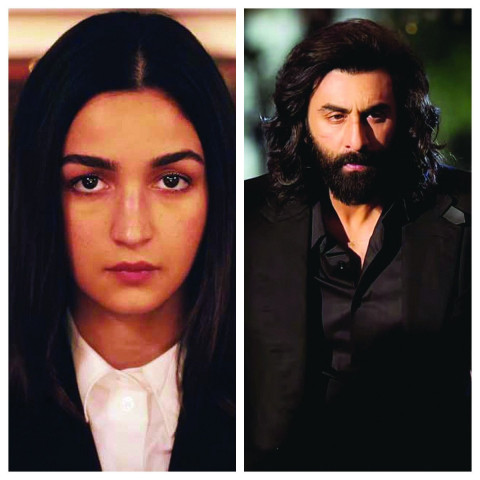Jigra' vs 'Animal'
Alia Bhatt shuts down similarities between the films after netizens complain

Actor Alia Bhatt recently addressed the comparisons between her upcoming film Jigra and her husband Ranbir Kapoor's Animal, acknowledging the buzz but dismissing the notion that there is any real similarity. While Jigra follows a sister (played by Bhatt) who goes to great lengths to save her brother from death, Animal centres on a son (Ranbir) taking extreme measures to avenge an attack on his father (Anil Kapoor). The two share a common thread of familial sacrifice, but Bhatt was quick to point out that this is a broader theme seen in countless films, as per The Indian Express.
"I wouldn't say there's any competition between us," Bhatt remarked. "I feel very fortunate that my husband is also my best friend and a wonderful actor. We often discuss our films and scenes with each other. I talked about Gangubai Kathiawadi and Jigra. Every time I had a confusion, I would discuss it with him and he did the same with me for Animal."
On the comparisons between Jigra and Animal, she added, "I know people have been comparing the two, but there really aren't many similarities. It's not just about Animal or Jigra; a common theme in many films is doing something for a loved one. It's a genre in itself, and many movies have been made on these lines. So aside from that one aspect, there aren't any direct similarities between the two films."
Borrowed plot lines
And Bhatt is right. The notion of familial loyalty and sacrifice is one that has been explored across genres and industries. But could these comparisons be more than just surface-level parallels? Given Bollywood's long history of borrowing plotlines from Hollywood, it's not far-fetched to consider that some may see echoes of Animal in Jigra. Bollywood isn't exactly known for its originality, and several high-profile films have been strikingly "inspired" by their Hollywood counterparts.
Take, for instance, Ghajinia 2008 Bollywood blockbuster that drew heavy inspiration from Memento, Christopher Nolan's mind-bending thriller about a man with short-term memory loss who tries to solve his wife's murder. Ghajini followed a similar plotline, with Aamir Khan's character seeking revenge for the death of his love while battling memory loss. Another example is Partner (2007), which was a Bollywood adaptation of the Hollywood hit Hitch. In both films, a love expert teaches a hapless man how to woo women, with many scenes lifted almost directly from the Will Smith-starrer.
So, while Bhatt downplays the comparisons between Jigra and Animal, it's not unreasonable for audiences to draw lines between films, particularly when Bollywood has a well-documented track record of leaning on Western cinema for inspiration.
Cancelling KJo
Shifting gears from the films themselves, Karan Johar's involvement in the production of Jigra has become the latest subject of controversy, sparking debate about nepotism and ethics in Bollywooda discussion that has become more heated in today's social media-fueled cancel culture. Johar, a frequent target of online trolling, recently found himself in hot water after a clip from an interview with filmmaker Vasan Bala went viral. In the clip, Bala expressed dissatisfaction with Johar for forwarding an early draft of the Jigra script to Alia Bhatt without his permission. According to Bala, the script still had spelling and grammatical errors, which he would have corrected had he known it would be sent to Bhatt.
The incident blew up on social media, with accusations of favoritism and Johar's recurring reputation for nepotism reigniting among fans and critics alike. It's no secret that Johar has long been in the crosshairs of social media's ire, particularly when it comes to his habit of working with star kids. What might have been a minor misunderstanding between colleagues quickly snowballed into a trending controversy, with countless tweets and posts berating Johar for bypassing the filmmaker's authority.
Johar, not one to shy away from addressing his critics, posted a lengthy note on Instagram in response to the backlash. "Twitter became X and became my X a while ago," he wrote, referencing his own break from the platform. "I broke up with the nauseous noise and muted the unwarranted angst. But social media is like the Loch Ness monsterit gets to you even when you can't see it." He clarified that Bala's comments had been taken out of context, adding, "The grave misinterpretation of his comment about me sending the script to Alia without his grammar checks made me laugh initially at the ludicrousness of it all, but now it is truly annoying me."
Johar also pointed out that Bala had spoken with "pure innocence and so much love" during the interview and urged people to listen to the entire conversation before jumping to conclusions. "I fold my hands and tell everyone please hear and read entire interviews before making clickbait assumptions," he added, pleading with the online community to take a step back from their rush to judgment.
Vasan Bala himself has since elaborated on the incident in an interview with Tried and Refused Productions, explaining that he had sent a rough draft of the script to Johar in a moment of inspiration. "I had written a very rough email, stream-of-consciousness thoughts, sent it to Karan, and six to seven hours later, he called saying that I have already sent it to Alia," Bala recalled. "I was really not happy with it. I was like I would have at least done some spell check, grammar check, hygiene." Despite the mix-up, Bala stressed that Johar's actions came from a place of enthusiasm and faith in the project.



















COMMENTS
Comments are moderated and generally will be posted if they are on-topic and not abusive.
For more information, please see our Comments FAQ